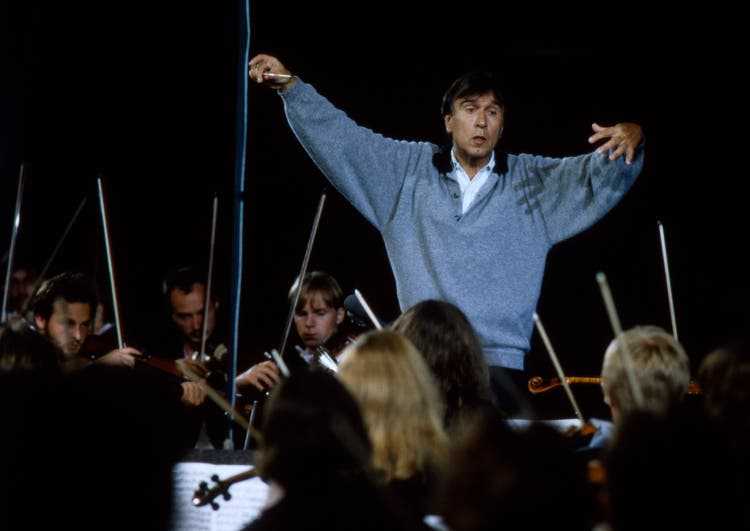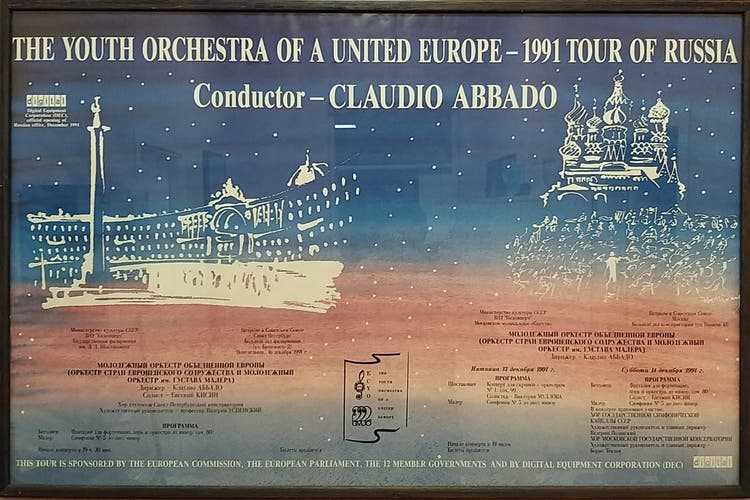In December 1991 the USSR disintegrated. A number of young Swiss musicians experienced the historic moment up close, on a tour in Russia. A search for traces after thirty years.
On December 21, 1991 the Soviet flag was still waving in Moscow, at the end of the month the USSR was history.
In mid-December 1991 around 130 young musicians from all parts of Europe embarked on a unique Christmas tour: they traveled to Russia with the world-famous conductor Claudio Abbado to play concerts in Moscow and St. Petersburg. For almost two weeks they formed a new orchestra that combined two different visions of Europe.
“I still get a chicken skin today when I think back on it,” says oboist Barbara Tillmann. On a rainy autumn day thirty years later we are sitting with the cellist Anita Jehli on the terrace of a café on Zurich’s Limmatquai. It was only later that they realized that they had seen the last days before the dissolution of the Soviet Union on their trip to Moscow and St. Petersburg.
Shortly before landing in Moscow, the anticipation of the concerts was mixed with a feeling of trepidation. Because the image that the West had of Russia was not least shaped by the Cold War. It was a journey into the unknown, into a strange world.
“When we flew over the city, we saw nothing. Everything was dark, the usual sea of lights that we knew from other big cities was missing, ”says Jehli, who now plays as solo cellist with Camerata Switzerland and the Ensemble Pyramide. “After arriving, it was almost eerie to be driven to the hotel through poorly lit streets.”
In Moscow it was bitter cold, outside there was dirty gray snow. Long queues formed in front of shops. “I will never forget the great poverty of the people,” says Jehli. The musicians from abroad, on the other hand, were greeted with caviar and champagne. “At an aperitif we simply smuggled in a Russian cellist whom we already knew. We then filled two sacks of groceries for her and secretly brought everything out the door. “
Tillmann, who works as a chamber musician and teaches at the Zurich University of the Arts, remembers that she also packed soap, sheet music and mouthpieces for oboes in her suitcase before leaving. “There were Russian students who had to use the same mouthpiece for a year. That was unimaginable for us. We put the things we had brought with us behind a curtain after a concert. “
A unique orchestra
At that time, the two Swiss women played in the Gustav Mahler Youth Orchestra, which already toured Europe before the fall of the Berlin Wall, initially mainly with musicians from Austria and the Eastern Bloc countries. Claudio Abbado founded the orchestra in 1987 with supporters in Vienna. Under the patronage of the Council of Europe, he wanted to put his ideal of a culturally united Central Europe into practice. Shortly after the fall of the Wall, Swiss people joined the group.
The youth orchestra of the European Community, founded in 1976 by resolution of the European Parliament and significantly influenced by Abbado as founding conductor, only accepted applicants from EC countries. For the Russia tour, half of the two orchestras each formed the youth orchestra of a united Europe, which only existed for this occasion.

The conductor Claudio Abbado rehearsing with a youth orchestra in Berlin, 1988.
At the first concert of the musicians in Moscow’s Tchaikovsky Conservatory, President Mikhail Gorbachev and his wife Raisa were among the guests. Less than two weeks later, on December 25th, he had to resign from his position.
After the failed coup attempt by communist hardliners in August 1991, arch-rival Boris Yeltsin, who recently became president of the Russian republic, de facto overthrew him. With his colleagues from Ukraine and Belarus, Yeltsin decided on December 8th – just a few days before the arrival of the European orchestra – to dissolve the USSR. A decision that the other successor republics of the Soviet Union confirmed shortly afterwards in the declaration of Alma Ata. At the end of the year, the Soviet Union was history.
The violin in the taxi
The American music critic Norman Lebrecht writes in his book “Why Mahler?” That Gustav Mahler’s 5th Symphony made a deep impression on Gorbachev in concert. According to Gorbachev, he feels that this music can also be related to the current situation in his country, to all the passionate struggles during the reform process he initiated. The pan-European orchestral project would not have existed without glasnost and perestroika. In his wife Raissa, Mahler’s music caused desperation. “It leaves me with the feeling that there is no way out.”
The Russian violinist Anna Kipriyanova from St. Petersburg, who has played in Germany for a long time in the Gürzenich Orchestra in Cologne, sat on the stage with her back to the box of the presidential couple. “I felt throughout the concert that they were listening to us.”
Leading political representatives of Europe who supported the tour had long recognized the signs of the times. They invited Yeltsin to the second concert in Moscow. The President of the European Commission, Jacques Delors, as well as heads of state and government such as the German Chancellor Helmut Kohl and Great Britain’s Prime Minister John Major praised the tour as a contribution to international understanding.
On August 19, the day of the coup attempt, Kipriyanova was on a summer tour of Europe with the Gustav Mahler Youth Orchestra. She and other Russian musicians were no longer allowed to travel to concerts in London; they were not given a visa. “We flew back to Moscow, the city was full of tanks. We heard gunshots too. Out of sheer excitement, I forgot my violin in the taxi, I never saw it again. ”
Kipriyanova was only 19 years old at the time and was not very interested in politics. “Everything that I experienced on tours in the West, this get-together with young people from all over Europe, was much more exciting for me than what was going on in my country.”
Suddenly become a Westerner
Conversely, western musicians who traveled to Russia in December observed what was going on in the east with interest. In addition to the impressive concerts with Abbado, the violinist Régis Bringolf, born in Lausanne, has many picturesque details in mind. «In a splendid night train we drove from Moscow to St. Petersburg, where the third and final concert took place. The heating was running at full blast and a Russian babushka served us tea from the samovar. ” Bringolf, who joined the Gustav Mahler Youth Orchestra while studying in Austria, now plays as a chamber musician in the Alban Berg Ensemble Vienna.
Like Bringolf, most of the orchestra colleagues at the time embarked on a professional career. You are concertmaster and section leader in large orchestras, chamber musicians and university lecturers.
The cellist Georg Schaar, who comes from Thuringia, decided on a different path. He became a pastor and currently lives in Überlingen on Lake Constance, not far from Switzerland. It was only after the fall of the Berlin Wall that he got to know western countries through the Gustav Mahler Youth Orchestra. “In Russia in 1991 we East Germans were suddenly seen as Westerners,” he said with astonishment during the Christmas tour. In the youth orchestra of a united Europe, which represented the entire continent, he noticed that there were quite large differences in mentality among the members.

Poster announcing the Christmas tour of the youth orchestra of a united Europe, 1991.
He was not alone in making this assessment. “As Swiss women, we were in a group in the Mahler Orchestra that had nothing to do with the EC. And suddenly we met English and French people here who were much more self-confident than we were, ”says Barbara Tillmann. “We felt that they thought they were the better and that they were in greater competition with one another.”
When making music together on the stage, everyone found each other united. Abbado kept an eye on each one and had all the names in mind. His legacy is still alive. Switzerland continues to have a permanent place in the Gustav Mahler Youth Orchestra, which stands for a Europe without political borders.
